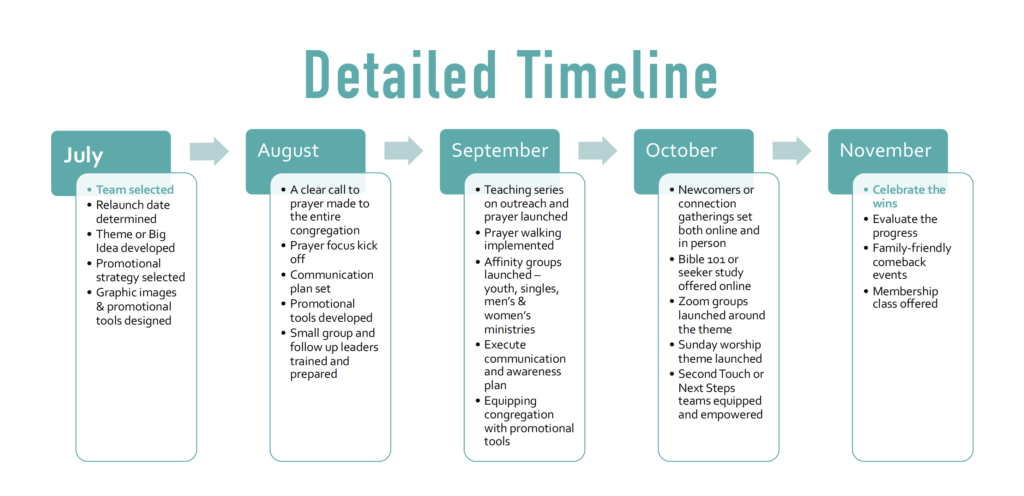“See, I am doing a new thing! Now it springs up; do you not perceive it? I am making a way in the wilderness and streams in the wasteland.” Isaiah 43:18
Every church will have a unique opportunity to Relaunch their ministry this fall. Whether your church is six weeks old or 170 years young, each church will have a chance to reorient their ministries, equip their leaders and inspire their people to fulfill the mission of Jesus of making more and better disciples in their unique context.
Here are ten practical steps to help you and your team to think through your Relaunch Plan.
1. Develop a team.
Too many pastors try to carry the load all by themselves, which is an unbiblical notion. Christianity is a team sport. Team building is one of the skills successful pastors need in their tool belts. Learning to pick the right players on your team is crucial. Guiding and leading the team is imperative. Trusting the team to execute the plan is empowering. Celebrating and encouraging the team is vital. I encourage pastors to use short-term task forces with a specific task, along with a starting and ending point. If you built a task force for each of your major outreach initiatives for fall, winter, and spring, your team-building skills would improve each time. Team building is a skill that is honed through the “learning by doing” process. Getting key influencers involved in the process is vital to building positive momentum throughout the church.
2. Determine a Date.
You will first need to pick a date for this relaunch. In some communities it will be early August, others will be Sunday after Labor Day, and still, others will choose early October. Whatever date you pick is okay as long as you select a date. Momentum will be generated as you bring focus to a specific timeframe. Remember, God, in his infinite wisdom, chose to launch the church on Pentecost. This date has a rich theological significance as well as many practical implications.
3. Develop a timeline.
To develop a reasonable schedule, start with the last date of the project, and work backward. If you are doing a fall growth push, here are a couple of ideas. End your fall outreach campaign on the first weekend in November with a family-friendly, social distancing appropriate comeback event and start July first with the selection of the team. We call this the “three-month rule,” which is to begin the detailed planning process at least three months before the launch of the outreach campaign. Here is an overview of what would happen in those three months:

4. Create a Theme or Big Idea.
Brainstorm ideas for delivering strong biblical content that addresses the heart issues of your mission field. Many pastors struggle with the creative aspects of leadership. I recommend that pastors research and purchase some of the excellent outreach or spiritual growth campaigns available. Many of these come with timelines, job descriptions, graphics, sermon ideas, and small group materials. The key is planning. After the church has done a few of these campaigns, then they can take a shot at developing their own.
5. Promote Prayer:
Raise the spiritual temperature of the church. It is a must to incorporate a church-wide prayer project for before and during the campaign. One example: Call the church to “pray for five neighbors, for five minutes a day, for five weeks” before the outreach campaign. Another idea would be to mobilize the church to prayer walk your whole community before the campaign. You could also call the church to a season of prayer and fasting. Still another idea is to do a 21 Day Prayer Campaign to get your churches to focus on praying missionally for your community.
6. Create Buzz Outside the Church:
Brainstorm ideas for creating buzz throughout your church, your community, and all the social media platforms. Work with your team to think of ways to get the word out. I like to use the biblical language of sowing when it comes to getting the word out to our community and through our social media networks. Here more is information on the Sowing and Reaping Principle.
7. Create Excitement inside the Church.
Create urgency through effective vision casting. Create energy by promoting opportunities. Creating a sense of synergy throughout the church is essential. Drive the theme throughout the church. Getting every section of the church moving in the same direction is a momentum building experience that creates positive energy and good morale. So, take your theme and drive it throughout the church from seniors to youth, from singles to toddlers!
8. Develop next step opportunities.
Creating opportunities for new guests to connect relationally, as well as spiritually, is crucial to having a successful outreach campaign. Planning some family-friendly event is a great way to get people involved in serving for the first time and connecting relationally with others in the church. Offering entry-level Bible studies like Bible 101 or Christianity 101 within weeks of your outreach campaign is vital in providing those next steps for those that are spiritually interested. Finally, you want to offer people an opportunity to connect with the church and its leadership by providing some newcomer’s gathering or party at the pastor’s event where they hear the story and vision of the church as well as connect relationally with key leaders.
Offer a Clear Call to Action
- “Go into our online prayer room after the service”
- “Come to our ‘after party’ immediately after the service to meet other people and discuss the sermon
- “Download this resource for use during the week
- “Call a friend and [fill-in response relevant to the sermon], and then in your online small groups, tell each other how it went”
- “Please let us get to know you better by filling out a digital welcome/connection card”
- “Take this online survey to find the way that you can best serve right now”
- “If you prayed to receive Christ, begin telling others by putting something in the chat”
- “Ask God what He wants you to give financially, and then do whatever He shows you”
- “Sign up for a ‘meet the pastor webinar’ which temporarily replaces our ‘pizza with the pastor’ get acquainted event”
Source: Warren Bird, ECFA
9. Recruit volunteers to fill needed ministry roles:
Doing a relaunch is an excellent opportunity to recruit and train new volunteers for setting up, cleaning, event planning, children’s ministry, ushers, greeters, follow up, administration, new hosts for small groups, and small group apprentices and leaders, etc.
10. Drive your vision and values deeper into the culture of your church:
Remember, anytime you do an outreach campaign, it is an opportunity to drive your missional vision and values deeper into the lives of your people. The values of evangelism, community, spiritual dependence and community transformation come alive during the campaign and provide opportunities for personal growth and corporate maturity.
Conclusion:
Pastors, church leaders, and all followers of Jesus, this worldwide pandemic, is providing for us a defining moment. A moment to not only relaunch our churches, but it is also an opportunity to recalibrate our ministry priorities and for you as a pastor to retool pastoral and leadership skills. Pastors, I know, you are psychologically exhausted. I don’t think any of us would have imagined that we would be doing ministry in the fashion we are doing it today. And yet it is in moments like these that God shows up and does the unprecedented. May the God and Father of our Lord Jesus Christ give a fresh experience of his strength (Ephesians 3:16), a fresh encounter with his love (Ephesians 3:17-19), and a fresh vision for the future (Ephesians 3:20-21).
Read More: Ten Biblical Principles for Relaunch or Launching Your Church



